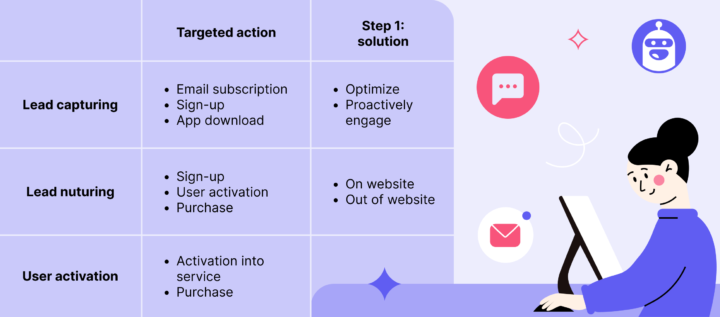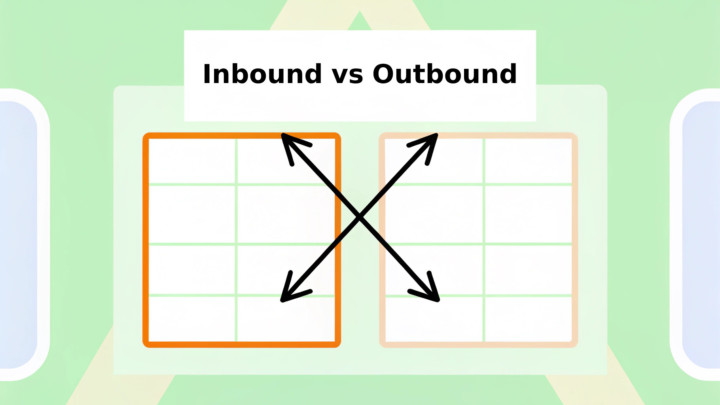Top 10 marketing automation tools for start-ups: Simplifying your journey in 2025

Overview
In 2025, many startups will face the daunting challenge of managing their marketing efforts effectively. We understand that navigating this landscape can feel overwhelming. That’s why identifying the top marketing automation tools is crucial for simplifying these efforts. Tools like HubSpot and Mailchimp not only save time and enhance efficiency but also empower you to engage meaningfully with your audience. This engagement is vital for driving growth and improving your decision-making through valuable, data-driven insights.
Imagine having the ability to connect with your customers effortlessly while freeing up precious time to focus on what you love about your business. With the right tools at your disposal, you can turn marketing from a chore into an opportunity for genuine connection. These platforms are designed to support you, making the complexities of marketing manageable.
By embracing these automation tools, you’re not just streamlining your processes; you’re setting the stage for sustainable growth. You deserve solutions that work for you, allowing you to thrive in a competitive environment. Remember, you’re not alone in this journey. Many startups have successfully leveraged these tools to transform their marketing strategies, and you can too.
Introduction
In today’s fast-paced business environment, we understand that startups often face overwhelming challenges. You’re juggling countless tasks, and the pressure to engage customers meaningfully can feel daunting. Marketing automation emerges as a vital ally in this landscape, offering a way to lighten that load and enhance your connection with customers. This powerful tool not only alleviates the burden of repetitive marketing tasks but also empowers you to focus on the strategic initiatives that truly drive growth.
As you navigate limited resources and the need for impactful marketing, it’s essential to grasp the benefits of automation. Imagine improving lead management and gaining valuable data-driven insights — marketing automation paves the way for more efficient and effective practices. Yet, with so many options available, it’s crucial to choose solutions that align with your unique needs and objectives.
This article is here to guide you through the significance of marketing automation for startups. We’ll explore best practices, highlight common pitfalls, and discuss the future trends shaping this dynamic field. Remember, you’re not alone in this journey; together, we can find the right path forward.
Understanding marketing automation: A startup’s essential tool
Running a startup can feel overwhelming, with countless tasks vying for your attention every day. We understand that managing repetitive marketing activities can take precious time away from focusing on what truly matters — your growth. That’s where marketing automation tools come into play, offering a powerful resource to help streamline those tasks. By implementing these tools, you can shift your focus towards strategic initiatives that drive your business forward.
Imagine simplifying your marketing efforts with functions like email promotions, social media postings, and lead nurturing — all designed to engage clients and boost conversions. In fact, 35% of users have reported that these promotional systems have significantly enhanced their decision-making abilities. This means you’re not just saving time; you’re also making smarter choices for your business.
With marketing automation tools tailored for startups, like HubSpot and Mailchimp, you can maintain consistent communication with your audience. This consistency fosters stronger client relationships, which can lead to increased sales. These platforms allow you to streamline your email campaigns, effectively segment your audience, and track engagement metrics. This capability doesn’t just simplify your marketing efforts; it empowers you to tailor your strategies to meet specific customer needs, enhancing your overall effectiveness.
However, it’s important to recognize that adopting these tools can come with challenges, such as initial implementation costs and resistance to change. As highlighted in the case study titled ‘Challenges of Automation Adoption,’ many organizations face these hurdles. But remember, you’re not alone in this journey.
As Angie, who oversees Cazoomi’s operations, wisely states, ‘As always, balance is key.’ This perspective emphasizes the importance of navigating the complexities of automation with care. You have the power to take the next step toward a more efficient future — embrace these tools and watch your business thrive.
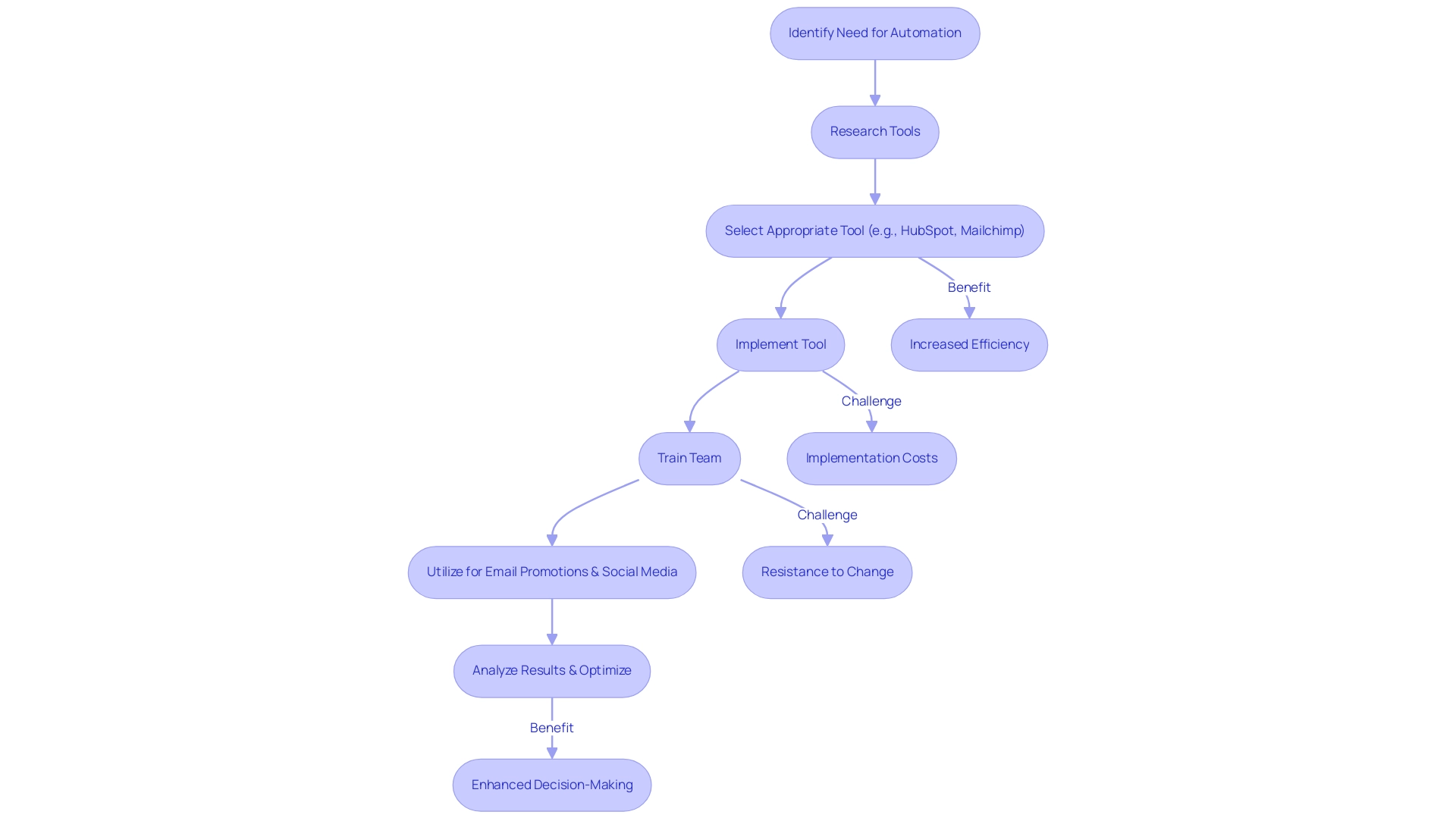
Why startups need marketing automation tools
Navigating the startup landscape can feel overwhelming, especially when it comes to resource allocation and maximizing impact on a tight budget. We understand the unique challenges you face. Marketing automation tools emerge as essential allies in this journey, offering solutions that can truly transform your operational efficiency and effectiveness.
Saving time: Imagine being able to automate repetitive tasks, allowing your team to focus on high-value activities like strategic planning and deepening customer engagement. This shift means you can make the most of the resources you have available.
Enhancing efficiency: Automation also reduces the risk of human error, ensuring your marketing campaigns are executed promptly and accurately. This reliability is crucial for establishing a strong foothold in competitive markets.
Improving lead management: Platforms like Dashly excel at capturing and nurturing leads automatically. By guiding prospects through the sales funnel with tailored communication, you can cultivate stronger client relationships and enhance conversion rates.
Data-driven insights: Automation platforms provide robust analytics that offer valuable insights into customer behavior. This data is instrumental in refining your promotional strategies, enabling you to adapt quickly to changing market conditions.
However, we recognize that startups often face significant hurdles, such as implementation costs and employee resistance to change. These factors can impede the adoption of marketing automation tools. According to a recent study, the promotional technology sector is expected to expand at a CAGR of 12.9% from 2021 to 2030, highlighting the growing reliance on these innovations. Moreover, HubSpot indicates that 70% of marketers plan to increase their use of automated tools in 2024, emphasizing a significant trend towards mechanization as a strategic necessity.
In the B2B sector, revenue from promotional technology is anticipated to increase by 13.9% each year, indicating a sector-wide transition towards adopting these tools for operational efficiency. The case analysis titled ‘Future Trends in Marketing Tool Utilization’ shows that a significant majority of promoters recognize the importance of automated tools in managing the complexities of contemporary promotion. Together, these insights confirm that marketing automation tools for startups are not just advantageous — they’re crucial for new ventures aiming to thrive in today’s intricate business landscape. You’re not alone in this; embracing these tools can be a game-changer for your success.
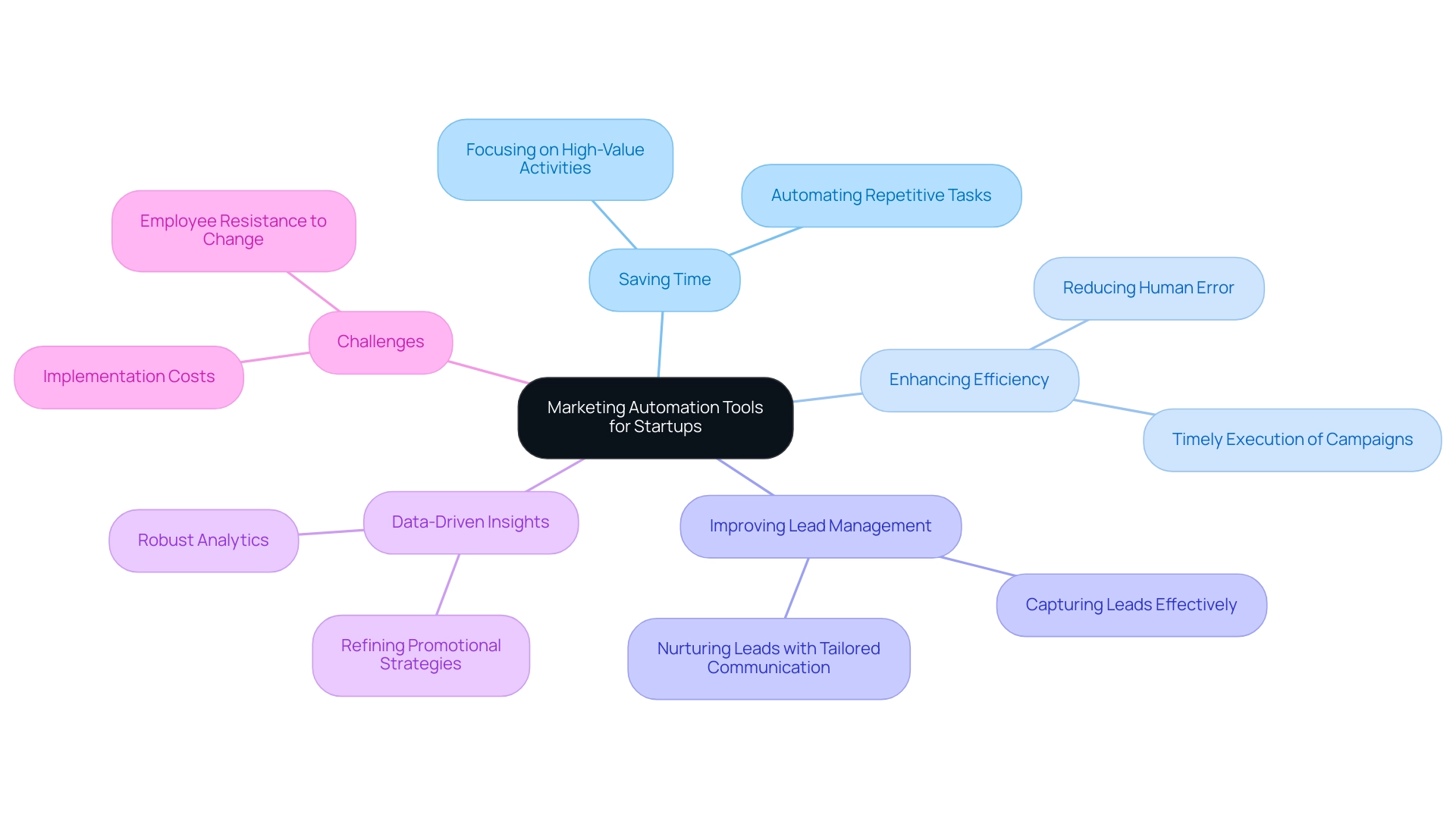
Dashly’s your versitile helper in marketing automation:
Choosing the right marketing automation tool for your startup
When choosing an automation tool for promotion, we understand that startups face a myriad of challenges. It’s crucial to prioritize essential criteria to make an informed decision that truly fits your needs.
- Ease of use: You want a tool that feels intuitive, right? An easy-to-navigate interface allows your team to focus on implementing strategies instead of getting lost in complex software. After all, 88% of marketers value automation tools that save time on reporting customer interactions, highlighting just how vital efficiency is.
- Integration capabilities: Imagine how seamless your workflow could be if your automation tool integrates effortlessly with your existing systems, like CRM and email platforms. This capability not only streamlines your processes but also enhances data consistency, creating a more cohesive promotional strategy. For instance, Dashly supports omnichannel communication, allowing your team to launch marketing campaigns across various platforms and manage them all in one place, boosting overall engagement and effectiveness.
- Scalability: As your startup grows, your promotional needs will change. It’s essential to select marketing automation tools that can scale with your business, accommodating increased complexity without needing a complete system overhaul. Dashly offers tools designed to streamline processes, including AI support bots, empowering you to handle growing client interactions effectively. Plus, dependable client assistance can significantly enhance the efficiency of your automation tools. Quick and knowledgeable support ensures any issues are resolved promptly, maximizing the potential of your chosen tool. Dashly excels here, providing features that enhance workflows and improve customer satisfaction. Additionally, their comprehensive knowledge base empowers users to find information and resolve issues independently.
- Cost-effectiveness: Operating on a tight budget? Evaluating the pricing structures of various marketing automation tools is essential. Look for options that deliver necessary features without compromising quality, ensuring that every dollar spent contributes to your growth. Companies manage to achieve 16k% ROMI with Dashly tools.
In a market projected to reach $6.65 billion in 2024, selecting the right marketing automation tools is more critical than ever. This expected growth signals a rising demand for effective technological solutions, emphasizing the need for startups to navigate these criteria thoughtfully and gain a competitive edge. As productivity writer Beatrice Manuel notes that B2B automation revenue is projected to increase by 13.9% each year. This insight underscores the importance of adopting marketing automation tools early in your startup journey.
This trend is further validated by the increasing reliance on platforms like Dashly to enhance promotional capabilities through optimized client interactions. Moreover, Dashly’s analytics features allow marketing teams to monitor customer service performance across all channels, set benchmarks for conversion rates, and identify opportunities for improvement, ensuring a seamless customer experience.
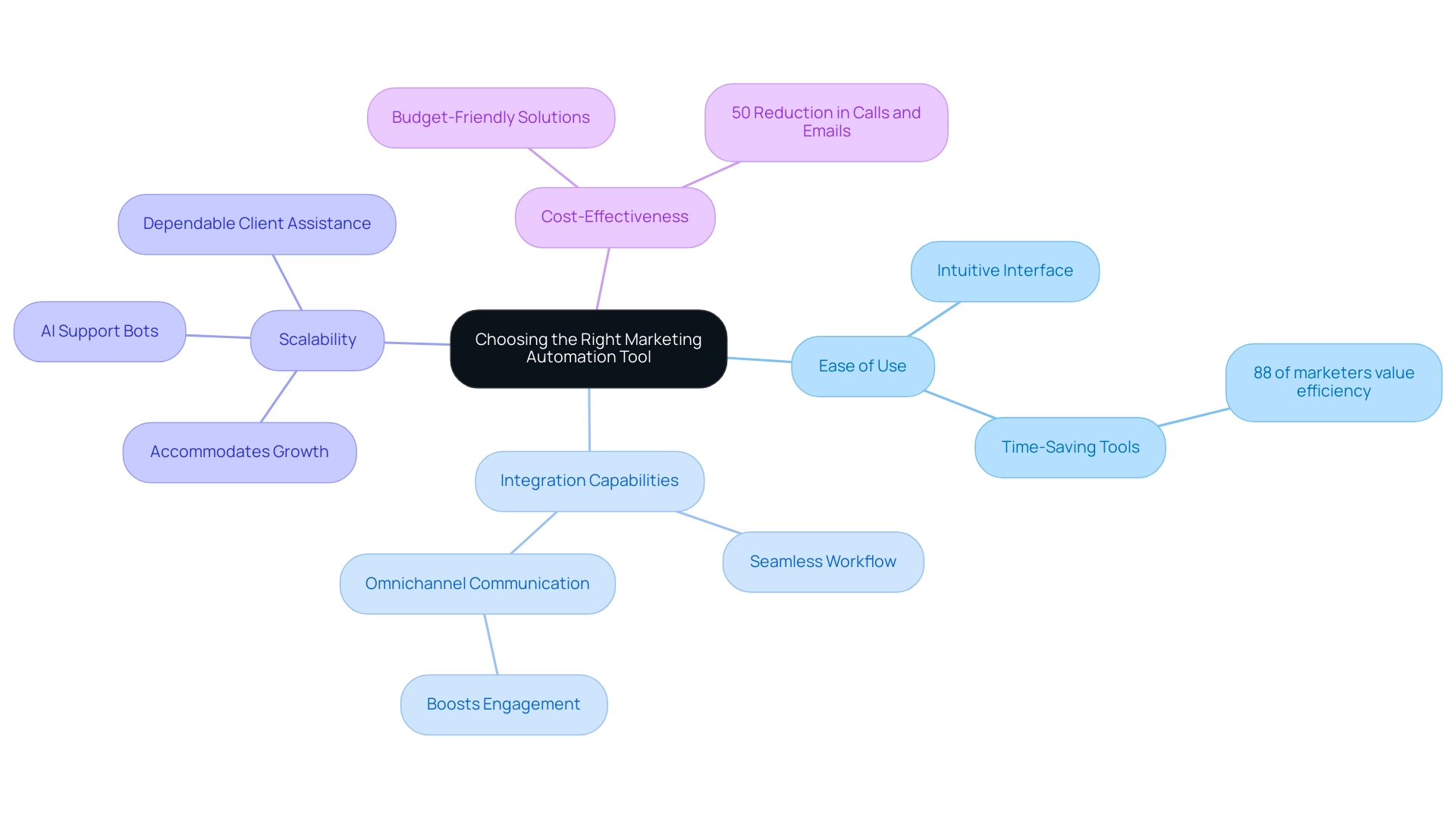
Top 10 marketing automation tools for start-ups in 2025
Here are the top 10 marketing automation tools for startups in 2025:
- HubSpot: We understand that managing various aspects of your business can be overwhelming. HubSpot is an all-in-one platform that integrates CRM, email promotion, and social media management, making it an excellent choice for comprehensive strategies.
- Mailchimp: If you’re looking for a user-friendly way to connect with your audience, Mailchimp is renowned for its powerful email promotion features, perfect for new businesses eager to engage effectively.
- ActiveCampaign: This tool excels in sophisticated workflow capabilities. It seamlessly combines email outreach with CRM functionalities, helping you improve user interactions.
- Dashly: Designed specifically for SaaS and e-learning ventures, Dashly focuses on conversational promotion and lead nurturing. It offers tools that engage potential clients and guide them toward conversion. With the promotional technology sector anticipated to expand at a CAGR of 12.9% from 2021 to 2030, tools like Dashly are becoming increasingly essential for startups looking to leverage this trend. As technology specialist Krunal Vaghasiya observes, “Promotional systems also assist in cultivating leads,” which is crucial for new businesses aiming to establish enduring customer connections.
- Pardot: A Salesforce product, Pardot provides strong B2B promotional solutions that emphasize lead management and analytics, perfect for expanding businesses.
- Marketo: Created for larger new ventures, Marketo focuses on lead management, analytics, and promotional systems to drive effective campaigns.
- GetResponse: This platform offers a combination of email promotion, landing page development, and automated features at an affordable cost — ideal for new ventures with limited funds.
- Zoho Campaigns: An economical option that provides crucial email outreach and management features, perfect for new businesses looking to optimize their resources.
- Sendinblue: Integrating email outreach with SMS campaigns and automated workflows, Sendinblue provides a versatile method for multi-channel promotion.
- Drip: Specifically tailored for e-commerce businesses, Drip focuses on creating personalized customer experiences that boost engagement and sales. The promotional technology sector was valued at $344.8 billion in 2021, with expectations to reach $13.71 billion by 2030, reflecting its growing acceptance among organizations.
Remember, choosing the right tool can make a world of difference in your marketing efforts. Each of these platforms offers unique features designed to help you connect with your audience and grow your business. You’re not alone in this journey — take the next step by exploring these options and finding what works best for you.
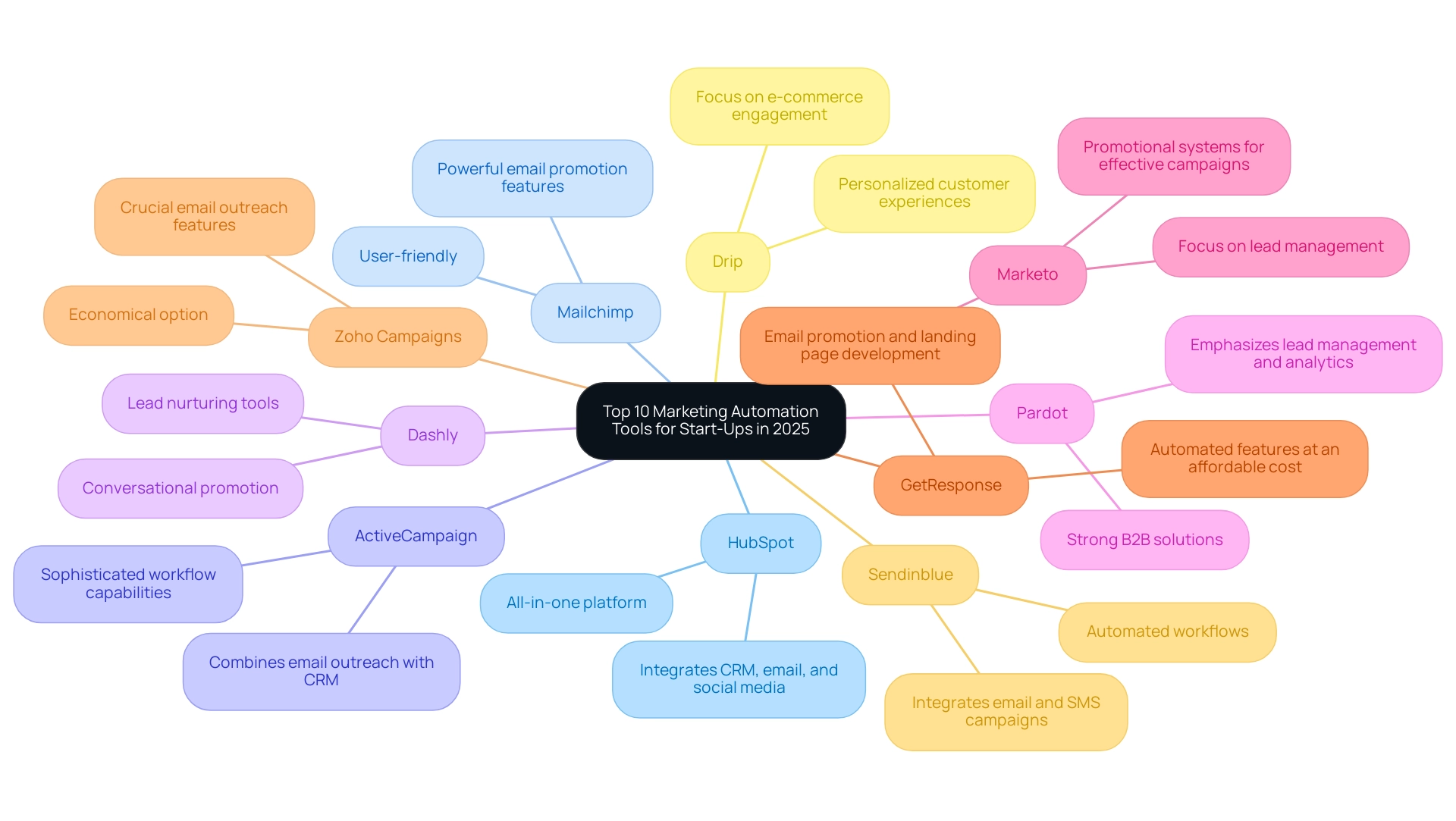
Dashly’s your versitile helper in marketing automation:
Best practices for implementing marketing automation in startups
To effectively implement marketing technology, startups should focus on a few key strategies that can truly make a difference:
Define clear goals: It’s essential to establish specific objectives for your mechanization efforts. Whether you aim to increase lead conversion rates or enhance customer engagement, having clear goals is vital. Research shows that organizations with specific objectives achieve significantly greater success in their promotional efforts. Did you know that 50% of promoters who utilize promotional tools do so daily? This statistic highlights the necessity of having clearly defined objectives.
Map customer journeys: Understanding the customer journey is crucial for crafting targeted campaigns that resonate with your audience. This step is particularly important as the adoption rate of promotional technology is expected to rise to 80-90% by the end of 2025. Personalization is becoming increasingly vital for effective engagement, making this mapping process more urgent than ever.
Start small: As you embark on your mechanization journey, consider starting with a few key processes. For example, scheduling social media posts is the most common application of marketing technology, with 88% of marketers utilizing it. By familiarizing yourself with these tools gradually, you can expand to incorporate more complex processes, minimizing overwhelm and allowing for a smoother transition.
Monitor and optimize: Regularly assess your performance metrics to identify areas needing improvement. Ongoing enhancement of your strategies is essential to stay aligned with changing market needs and to ensure your efforts yield the best possible results.
Train your team: Providing comprehensive training for all team members on how to effectively use the automated tools is crucial. Ensuring that your team is knowledgeable about these technologies is key to maximizing their potential and promoting overall success.
Integrating these practices not only aligns with professional guidance but also empowers startups to leverage the full advantages of promotional tools. As Beatrice Manuel, a recognized productivity author, emphasizes:
With its incorporation into contemporary promotional strategy, substantial advantages such as efficiency, cost savings, and heightened client involvement clearly illustrate the increasing acceptance and effectiveness of these technologies across various business sizes.
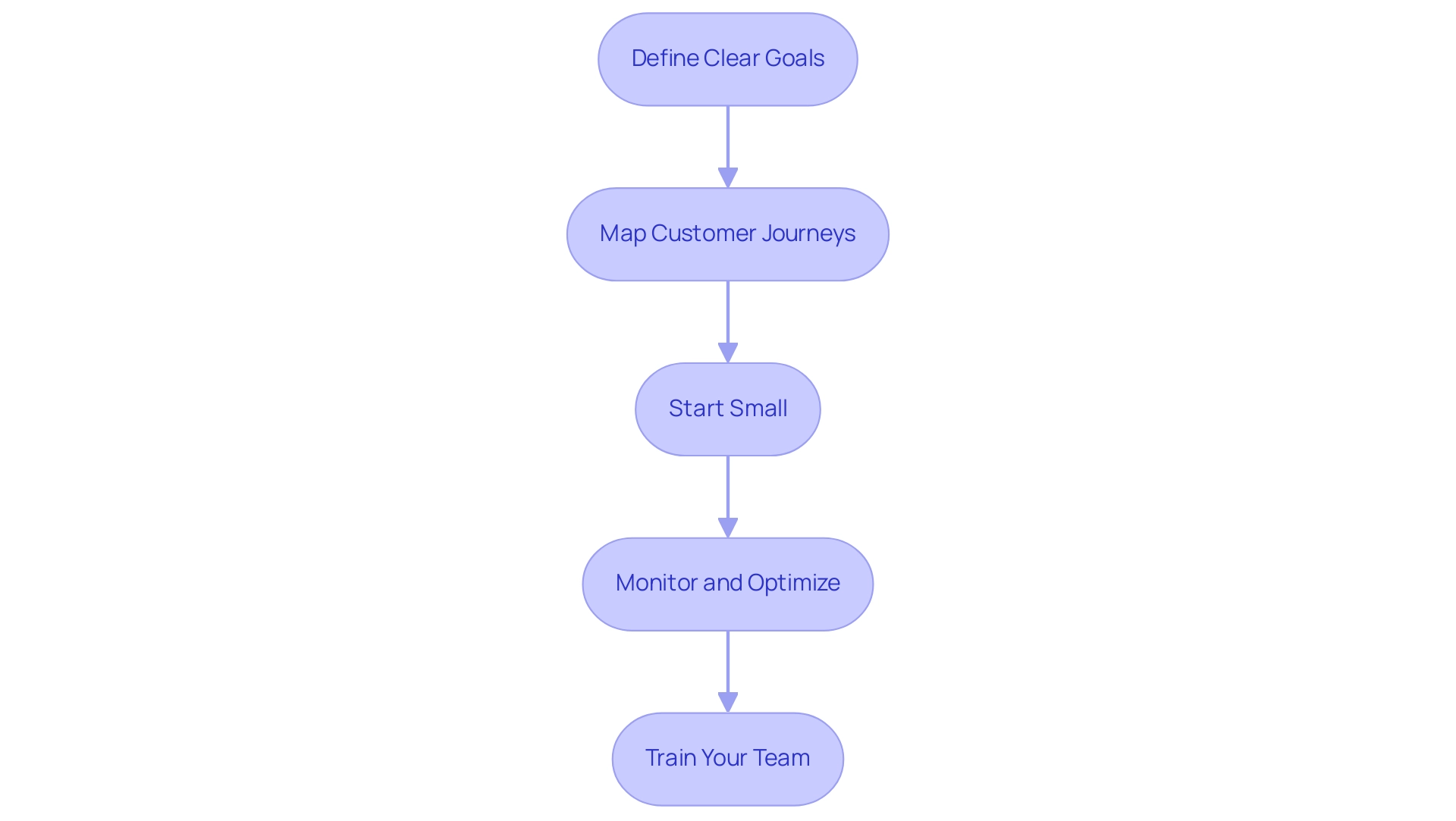
Common mistakes to avoid with marketing automation tools
Startups, we understand that navigating the world of promotional technology can be daunting. To help you avoid some common pitfalls, consider these insights:
Over-automating: While automation can boost efficiency, relying too heavily on it may result in impersonal communication. This can leave your customers feeling disconnected. Did you know that 37% of workers worry about automation-related job loss? It’s crucial to strike a balance to keep engagement and personalization alive.
Neglecting data quality: The success of your promotional efforts hinges on data quality. Poor data can derail your initiatives. Take the case of Theranos as a cautionary tale — it underscores the dire consequences of product failure. Regularly clean and update your databases to ensure effectiveness.
Failing to segment audiences: Generic messaging often misses the mark. If you overlook audience segmentation, you risk ineffective marketing efforts, especially when using automation tools. Tailoring your messages to specific segments can significantly enhance relevance and engagement.
Ignoring analytics: Without tracking performance metrics, you may be unaware of how effective your campaigns are. Regularly analyzing data is vital for refining strategies and improving future outcomes. Gartner predicts that by 2026, 30% of enterprises will streamline more than half of their network activities. Staying informed and adaptable is key to your promotional success.
Lack of strategy: Implementing automation without a clear strategy can lead to disjointed efforts and wasted resources. A well-defined strategy ensures that your automation aligns with your business objectives, ultimately enhancing your promotional effectiveness.
Remember, you’re not alone in facing these challenges. By addressing these common pitfalls, you can create a more effective promotional strategy that resonates with your audience.
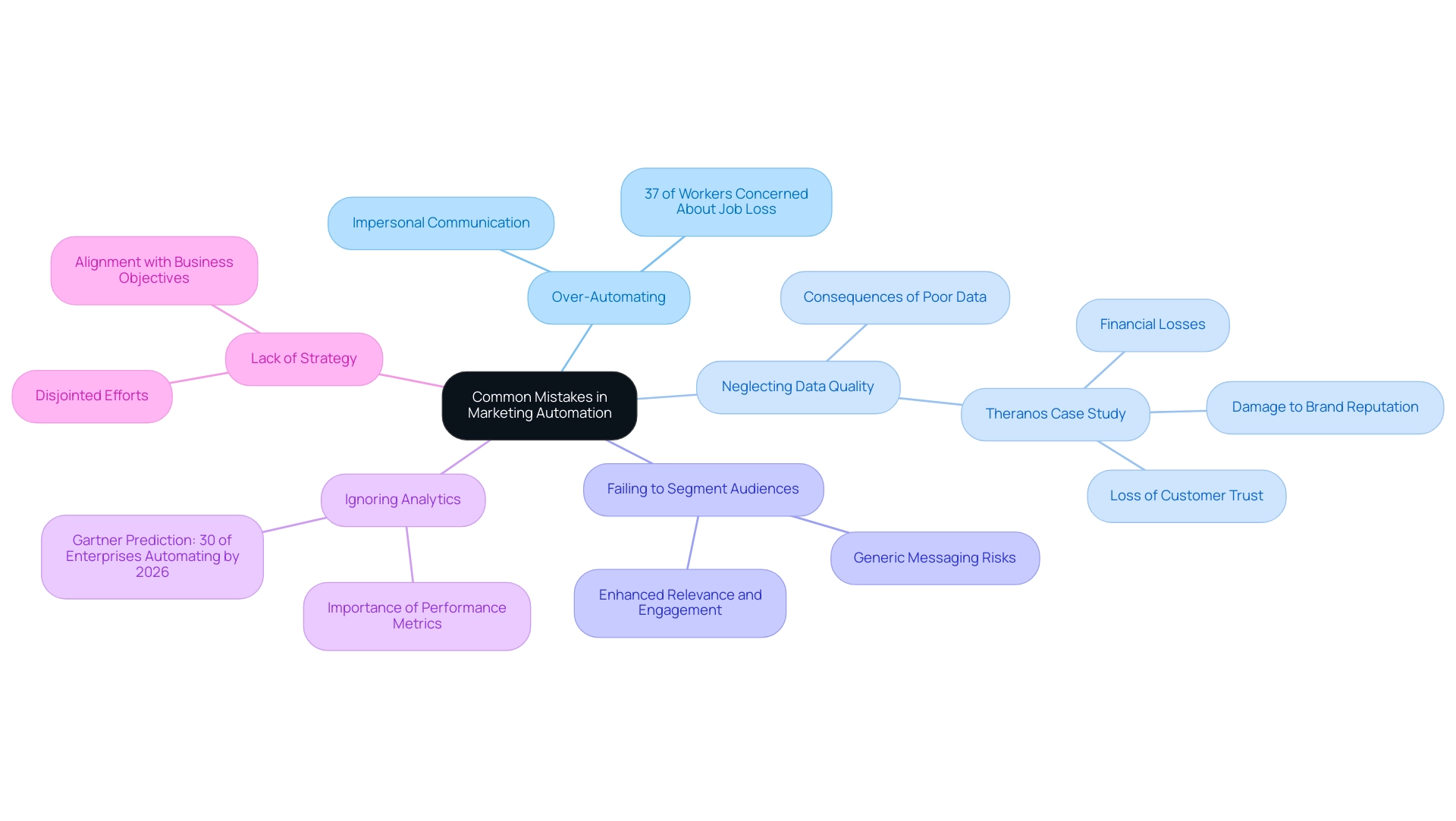
The future of marketing automation: Trends to watch for startups
As we look ahead to 2025, it’s clear that several trends are shaping the promotional technology landscape for new businesses. We understand that navigating this environment can be overwhelming, but recognizing these trends can empower you to thrive.
AI integration: Imagine being able to connect with your clients in a more personalized way. The integration of artificial intelligence in automation is set to flourish, allowing you to tailor interactions effectively. By utilizing marketing automation tools, you can automate routine tasks, freeing up your valuable time for strategic initiatives. Statistics reveal that AI can significantly enhance conversion rates throughout the marketing funnel, highlighting its vital role in today’s marketing strategies.
Omnichannel marketing: As you strive to provide seamless experiences across various platforms, implementing omnichannel strategies will become increasingly crucial. This approach not only elevates customer satisfaction but also increases conversion opportunities by ensuring consistent messaging.
Data privacy: We know that concerns about data privacy are rising. It’s essential for new businesses like yours to prioritize compliance and transparency in promotional practices. Safeguarding client data fosters trust and meets regulatory standards, which is vital for long-term success. By employing predictive analytics alongside marketing automation, you can better anticipate client behavior, allowing for more effective promotional efforts.
Enhanced attention to user experience: In the realm of promotion, a greater emphasis on user experience is emerging. Startups will focus on crafting meaningful and engaging interactions, ensuring that every touchpoint enriches the customer journey. As highlighted in the case study ‘AI Trends for 2025’, integrating AI into your promotional strategies is becoming a necessity for competitiveness. This shift encourages marketers to embrace AI not only for efficiency but also for creating impactful experiences.
Additionally, as Salesforce notes, a significant number of employees report that their employers do not provide generative AI training. This emphasizes the importance of equipping your team with the skills needed to leverage these advancements effectively. Remember, you’re not alone in this journey — embracing these trends can lead to a more successful future for your business.
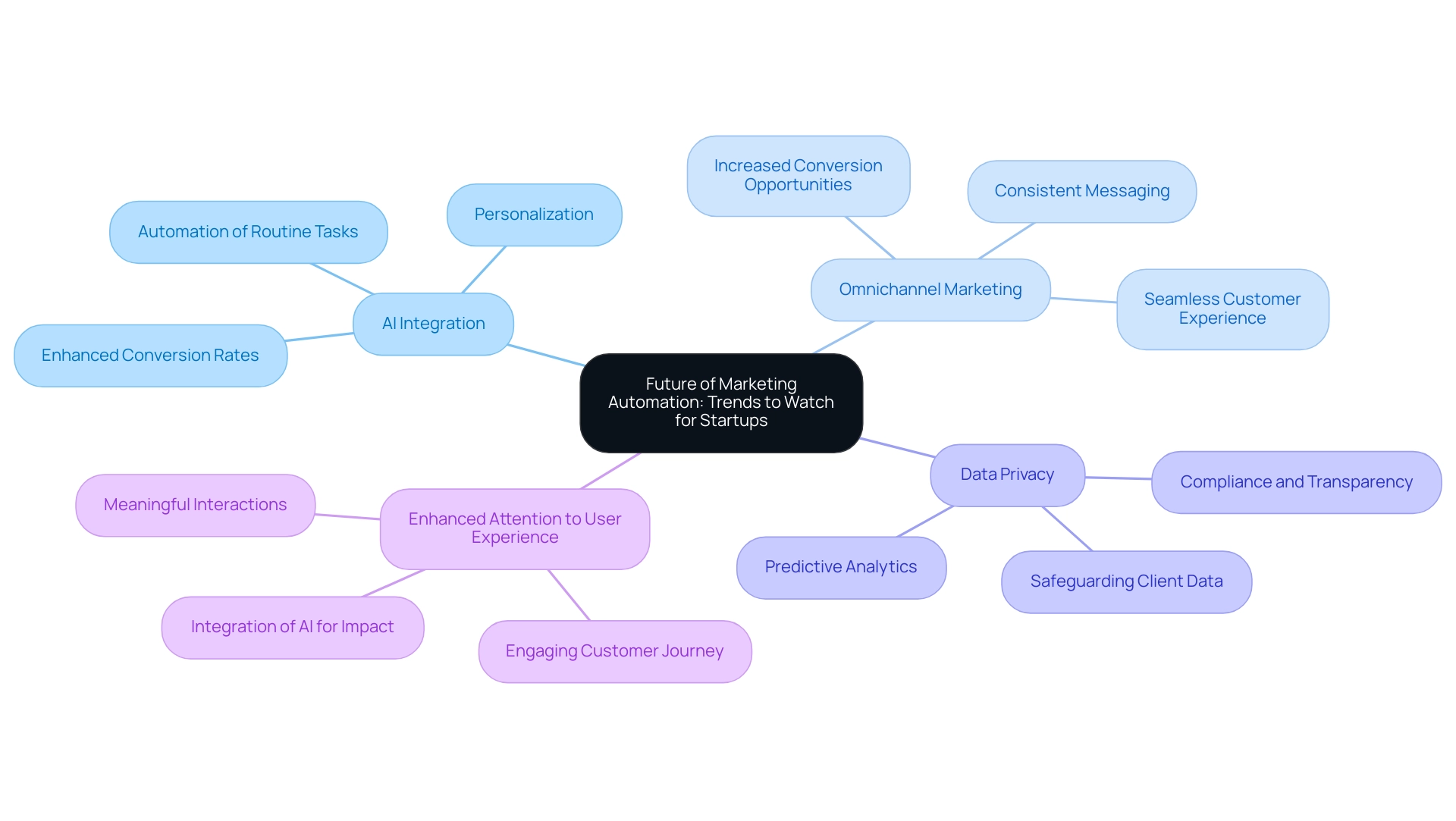
Build your omnichannel marketing strategy with Dashly:
Measuring success: Evaluating your marketing automation tools
To effectively assess the success of your promotional tools, we understand that startups often face unique challenges. Here are some supportive strategies to consider:
Track Key Performance Indicators (KPIs): Monitoring critical metrics like conversion rates, customer engagement levels, and return on investment (ROI) is essential for understanding how your marketing campaigns are performing. Did you know that 12.6% of marketers use Adobe Analytics to track email metrics? This example highlights how businesses can effectively measure KPIs, providing valuable insights into your tools’ performance.
Conduct regular reviews: Setting a schedule for periodic evaluations can help you identify areas needing improvement. This practice ensures your strategies remain aligned with evolving business goals and market demands, allowing you to adapt proactively.
Solicit feedback: Actively gathering feedback from both team members and customers is vital for understanding how automated processes affect user experiences. As noted by Pedalix, 27% of businesses face challenges due to ‘missing a process for systematic lead nurturing.’ These insights can illuminate the strengths and weaknesses of your current tools and processes, guiding you toward improvement.
Adjust strategies accordingly: Use the insights gained from your evaluations to refine and enhance your promotional strategies. Ongoing adjustments informed by performance data and feedback can lead to improved results and greater efficiency in your processes.
By applying these techniques, new businesses can systematically assess the effectiveness of their promotional tools. A survey revealed that 62% of businesses lack a systematic process for lead nurturing, with 27% identifying it as a significant challenge. This indicates a gap in promotional strategies, emphasizing the need for improved lead nurturing processes to enhance effectiveness. Ultimately, these steps can drive better results and foster business growth.
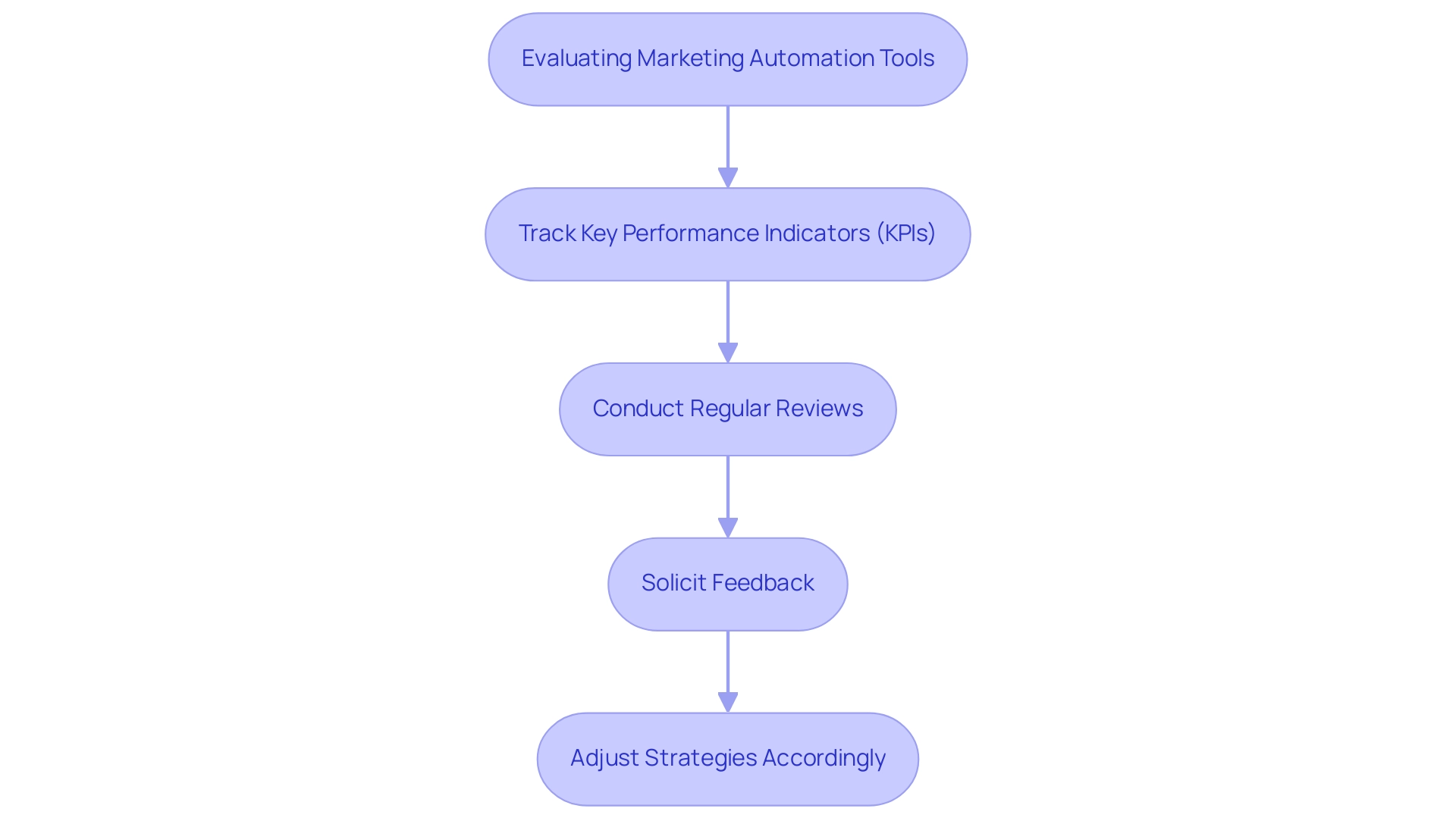
Leveraging AI in marketing automation for startups
AI is transforming marketing automation tools for start-ups, offering new businesses powerful resources to enhance their operations and client interactions. We understand that navigating the marketing landscape can be overwhelming, especially for start-ups. But fear not — AI is here to help. Here are five key ways in which AI is making a significant impact in 2025:
- Personalize client interactions: By leveraging advanced data analytics, AI enables startups to analyze behavior, preferences, and demographics. This insight facilitates the delivery of tailored content and recommendations, significantly enhancing engagement and client satisfaction. Notably, 68% of non-users are Gen X or Baby Boomers, highlighting a demographic that may be less engaged with AI technologies, as noted by Exploding Topics.
- Optimize campaign Performance: Machine learning algorithms are adept at identifying patterns in customer behavior. Startups can utilize marketing automation tools to gain insights that optimize promotional strategies in real-time, allowing for more effective targeting and messaging that resonates with their audience.
- Automate lead scoring: AI streamlines the lead qualification process by assessing prospects based on their likelihood to convert. This prioritization ensures that sales teams focus their efforts on high-potential leads, maximizing efficiency and increasing conversion rates. However, barriers remain; a study on “Challenges in AI Adoption” reveals that 70% of marketers report their employers do not provide generative AI training, which is crucial for effectively utilizing marketing automation tools in their marketing practices.
- Enhance client support: The integration of AI-powered chatbots revolutionizes service by providing instant responses to inquiries. This not only improves response times but also allows human agents to devote their attention to more complex issues, ultimately enhancing overall client satisfaction.
- Predict future trends: AI’s ability to analyze historical data empowers startups to anticipate market trends and shifts in consumer behavior. This foresight enables businesses to adapt their strategies proactively using marketing automation tools, ensuring they remain competitive in a rapidly evolving landscape. Additionally, tools like SurveyMonkey Genius® can help marketers improve processes and ROI through responsive surveys that collect customer insights, further illustrating AI’s role in enhancing promotional strategies.
As reported by Marketing Hub, around 20% of promotional teams are investing over 40% of their budgets into AI-powered campaigns, underscoring the importance of these technologies in driving growth. Moreover, with 53% of business owners expecting AI to enhance processes, it’s evident that adopting AI in promotional efforts is not merely a trend but an essential requirement for new businesses aiming to succeed in 2025.
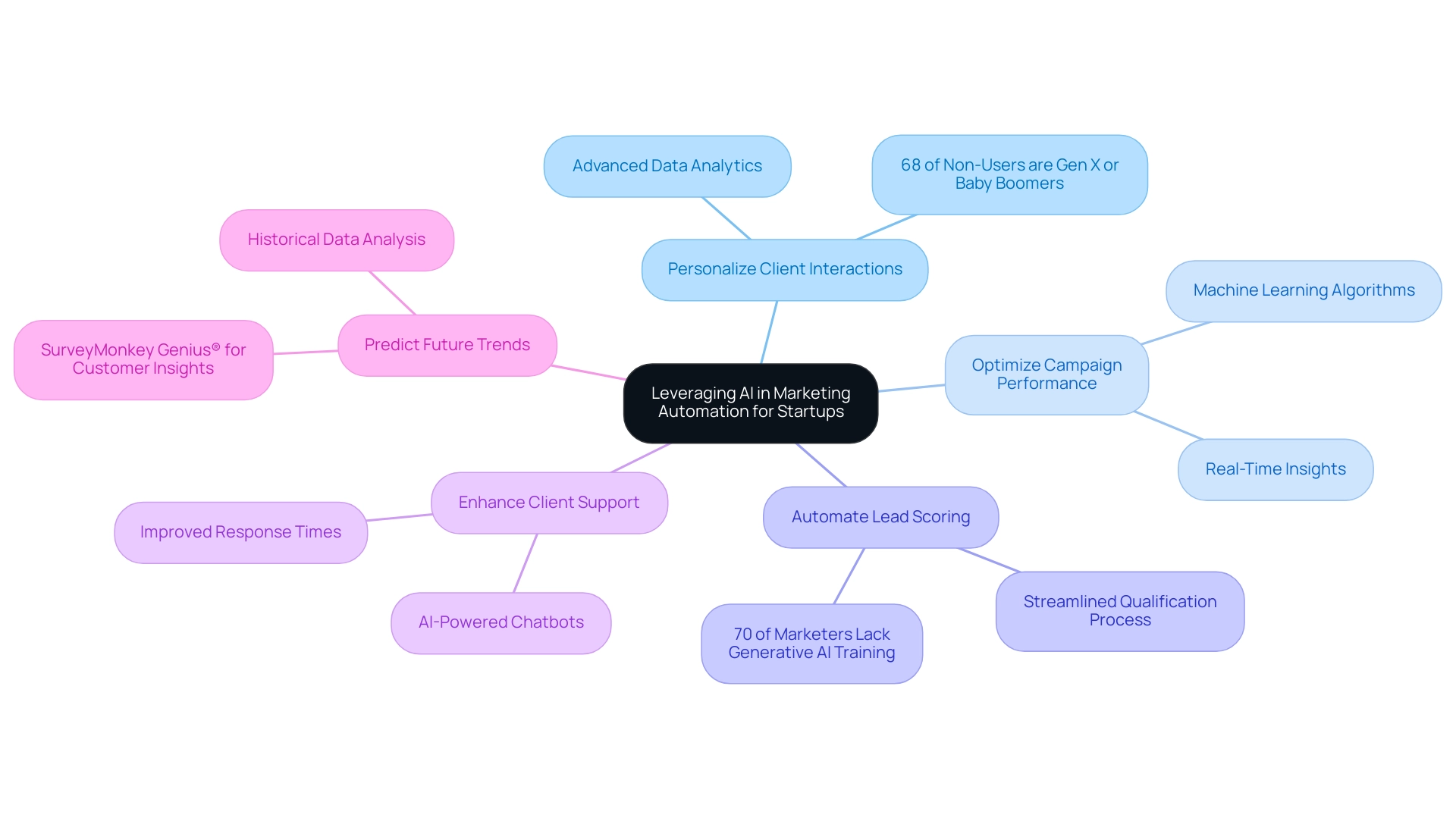
Embracing marketing automation: Key takeaways for startups
For new ventures striving to simplify processes and enhance customer interaction, embracing marketing automation tools is crucial. Here are some key takeaways for 2025:
- Understand the value: We recognize that marketing automation tools not only save time but also enhance efficiency and drive growth. This is vital for startups navigating fast-paced markets.
- Choose wisely: It’s important to select tools that align with your business goals and address your customers’ specific needs. This ensures that your efficiency efforts are both effective and targeted.
- Implement best practices: Adopting best practices during implementation can significantly boost your strategies’ effectiveness, leading to smoother transitions and better outcomes. Businesses that successfully integrate AI technologies can unlock new growth opportunities and optimize resources for strategic priorities. This is evident from case studies on AI and machine learning in automation.
- Stay informed: Continuously monitor emerging trends and technologies in promotional systems to maintain a competitive edge in an ever-evolving landscape. Gartner predicts a significant increase in network management by 2026, with 30% of enterprises streamlining more than half of their network activities. This foresight can inspire innovative strategies that set your startup apart.
- Measure success: Regularly assess the performance of your marketing automation tools to ensure they deliver the expected results. This will facilitate informed adjustments to your strategies as needed.
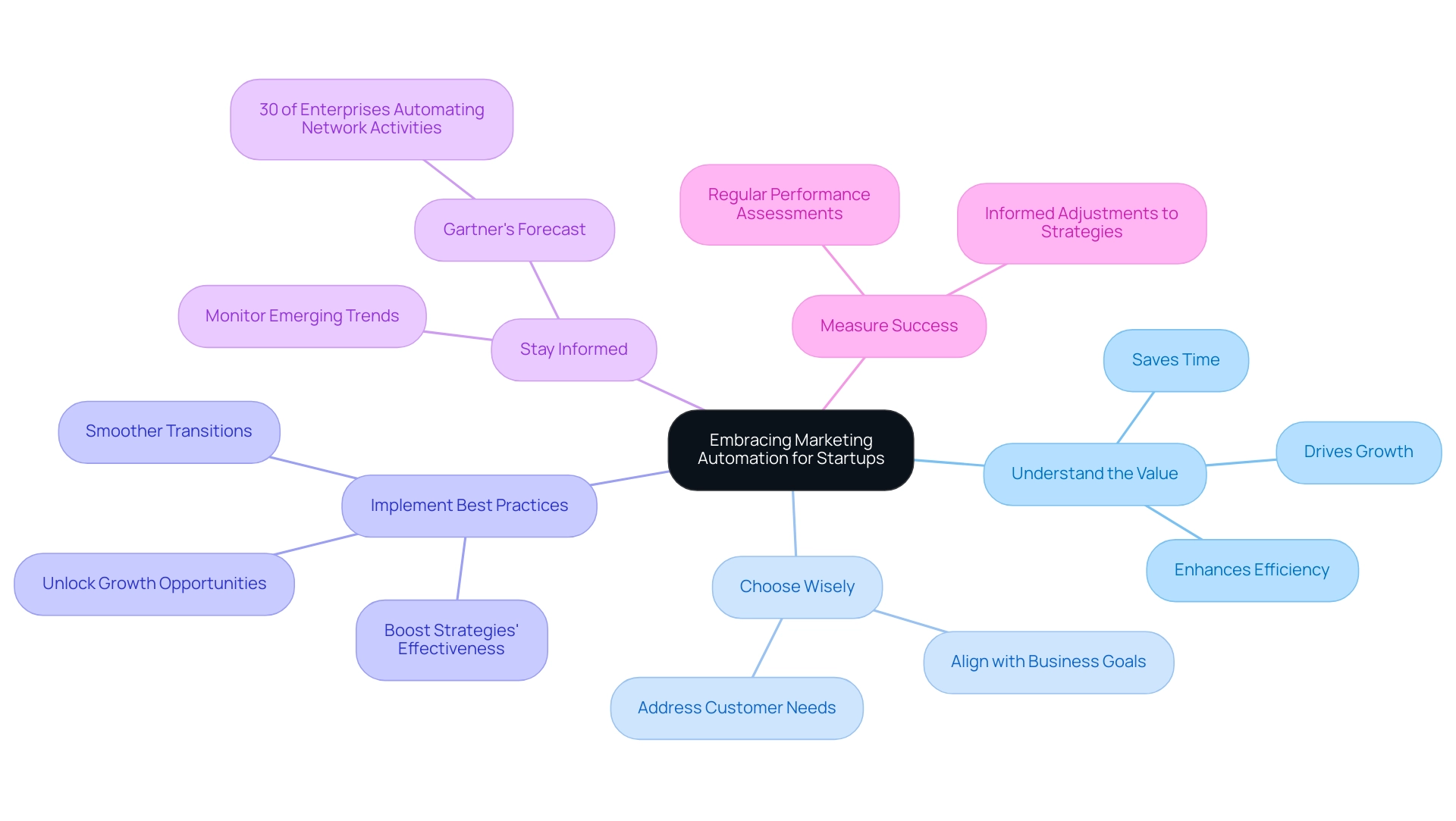
Conclusion
Marketing automation isn’t just a passing trend; it’s a vital strategy for startups eager to flourish in today’s competitive landscape. We understand the daily challenges you face, from managing repetitive tasks to enhancing lead management. By streamlining these processes and providing valuable data insights, marketing automation allows you to concentrate on strategic initiatives that truly foster growth. With the right tools, you can save precious time, boost efficiency, and enhance customer engagement, ultimately leading to higher conversion rates and stronger relationships with your clients.
As the marketing landscape evolves, it’s crucial to be aware of common pitfalls like over-automation and neglecting data quality. Implementing best practices — such as defining clear goals and mapping customer journeys—can greatly enhance the effectiveness of your automation efforts. Moreover, as AI and predictive analytics become increasingly integrated into marketing strategies, those startups that embrace these technologies will be better equipped to anticipate customer needs and adapt to market shifts.
Looking ahead, the future of marketing automation shines brightly, with trends indicating a growing reliance on these essential tools. Startups that recognize the immense value of automation and invest in the right solutions will not only streamline their operations but also elevate their marketing efforts. This ensures they remain competitive and successful in the dynamic business environment of 2025 and beyond. Remember, you’re not alone in this journey; embracing automation could be the key to unlocking your startup’s potential.





